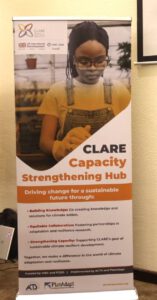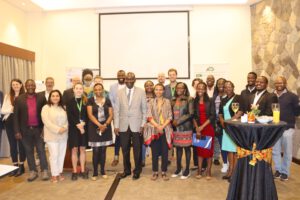PlanAdapt and ACTS host CLARE Capacity Strengthening Hub
Enabling Researchers and Users of Research Findings to Enhance Climate Adaptation Strategies and Policies and Innovate Impactful Adaptation Solutions
 The world is urgently in need of developing new ideas and enhancing existing solutions in view of coping and adapting to climate impacts, that increasingly cause economic, environmental and economic damage, and in extreme cases casualties.
The world is urgently in need of developing new ideas and enhancing existing solutions in view of coping and adapting to climate impacts, that increasingly cause economic, environmental and economic damage, and in extreme cases casualties.
In response to this critical issue, the CLARE initiative (a large-scale FCDO and IDRC-funded research programme across Africa and Asia) supports a range of action-oriented research projects. Embedded within the dynamic CLARE programme, the Capacity Strengthening (CS) Hub is a new and impact-focused partnership between two organisations, African Centre for Technology Studies (ACTS) and PlanAdapt, each bringing a wealth of strengths and experiences.
Underpinned by the principles of knowledge co-creation and equitable partnerships, the CS Hub envisions itself as a collaborative space, that bridges knowledge gaps, encourages self-mobilised capacity strengthening and supports cross-portfolio co-operation within the CLARE portfolio. Building from this foundation of supporting CLARE-internal actors and research grantees, the CS Hub intends to extend methodological advancements and enhanced capacities.
Launch of the Capacity Strengthening Hub (CS Hub) for Climate Adaptation and Resilience during Africa Climate Week
 The CLARE Capacity Strengthening Hub (CS Hub) initiative is built upon two needs: co-creation of knowledge and solutions for capacity strengthening that promotes climate action and enabling equitable collaborations in adaptation and resilience research. The hub is envisaged to address demand-driven capacity enhancement needs in order to promote climate action through adaptation and resilience research. The purpose of the CLARE CS Hub is therefore to enable researchers, practitioners, users (including those disseminating research, such as journalists) and decision-makers to drive adaptation action and build a more resilient future for those most impacted by climate change. As such, the target audience of the hub’s initiatives are researchers and knowledge brokers, and other climate action stakeholders covering individual CLARE project team, stand-alone CS initiatives, as well as the overall CLARE programme.
The CLARE Capacity Strengthening Hub (CS Hub) initiative is built upon two needs: co-creation of knowledge and solutions for capacity strengthening that promotes climate action and enabling equitable collaborations in adaptation and resilience research. The hub is envisaged to address demand-driven capacity enhancement needs in order to promote climate action through adaptation and resilience research. The purpose of the CLARE CS Hub is therefore to enable researchers, practitioners, users (including those disseminating research, such as journalists) and decision-makers to drive adaptation action and build a more resilient future for those most impacted by climate change. As such, the target audience of the hub’s initiatives are researchers and knowledge brokers, and other climate action stakeholders covering individual CLARE project team, stand-alone CS initiatives, as well as the overall CLARE programme.
 With its unique blend of collaborative ethos, innovative spirit, and catalytic potential, the CS Hub is excited to contribute to the landscape of capacity strengthening for climate adaptation and resilience research. For more information about the CLARE CS Hub and the wider CLARE programme, please visit https://clareprogramme.org/.
With its unique blend of collaborative ethos, innovative spirit, and catalytic potential, the CS Hub is excited to contribute to the landscape of capacity strengthening for climate adaptation and resilience research. For more information about the CLARE CS Hub and the wider CLARE programme, please visit https://clareprogramme.org/.
PlanAdapt’s team is composed of Sumetee Pahwa Gajjar, Martin Rokitzki, Catherine Fisher and Carys Richards, and likely further PlanAdapt Fellows will be involved. We are excited to bring our vast experience across various capacity-strengthening and research-for-impact initiatives to the table:
- Testing and proof-of-concept stages of innovation and collaboration spaces gathering adaptation researchers, experts, advisors from the Global South and North etc., i.e. Climate Co-Adaptation Lab, ultimately strengthen capacities of knowledge brokers in the area of climate adaptation, insights by learners / Fellows that includes the ability to mobilize operational ability in Africa and Asia-Pacific
- Co-PIs/ lead roles of proposed team members in IDRC and DFID/ FCDO-funded ASSAR programme (including strategic and intellectual leadership for research-into-use component)
- Strengthening knowledge broker intelligence of early career researchers from the Global South (part of climate cohort programme), in collaboration with several UK universities and ACU.
- Methodological and analytical reflections on shortcomings of previous CS activities/ approaches promoted and implemented in the field of international cooperation and climate research and action.
- Evidence reviews on how capacity strengthening is an integral part of research-for-impact approaches in action-oriented adaptation research
